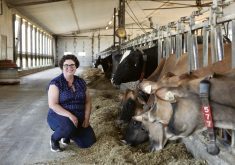Country Guide had a simple question to ask farmers who began their careers by working off-farm after graduation. Should today’s young farmers start the same way, with off-farm employment?
The eager and unanimous “yes” is still echoing down the halls.
But is it right? Or are they farmers only justifying the choice they made?
Well, according to our farmers, the skills and insights they gained from the experience are game changers, still creating benefits years after they returned to the farm.
Read Also

Riding the tariff rollercoaster
Farmers are accustomed to roller-coaster years. But the current geopolitical windstorm is something else entirely. On his cattle operation near…
A generation ago, getting an off-farm job was standard advice. Of course, that was when it was harder to create multiple incomes from a farm.
Working off-farm was also meant to help the next generation decide if they really had the passion to stick out farming’s ups and downs.
It would also show Mom and Dad if the younger generation had the discipline to thrive in an environment where they had to show up every day and where they had to prove they had the right stuff before they got promoted.
Today, it seems there’s equal — but sometimes different — value in off-farm employment and in what our current ‘wannabe’ generation can learn about running a farm. It might mean getting a chance to work for a variety of bosses and learning what makes a good leader, or seeing the processes that ensure good decisions do get made and bad ones don’t.
But let’s start with Terry Aberhart who decided to work off the farm when he was young because at the time the family farm at Langenburg, a couple hours east of Regina, was quite a bit smaller. He was also following the path of his father, who always had a job off-farm. Aberhart looked at career options that would be complementary to farming and decided to apprentice as an agricultural mechanic. Afterwards, he worked at some John Deere equipment dealerships and also on the farm.
“Getting out and working for someone else made me realize how much I wanted to be on the family farm,” he says. “I spoke to my dad and decided either I would grow the farm, really do that well, or find a separate career. I gave growing the farm a try.”
It turned out to be a good idea. With his father Harvey, brother Dan, wife Lichelle and others, Terry has grown the family farm acreage from 1,500 acres to just over 15,000. Aberhart Farms became one of the earliest adopters of many new technologies and methods, such as precision ag, direct seeding, minimum till and variable rate application.

Aberhart also started a custom spraying business and in 2015, Terry, Dan and Harvey founded Aberhart Ag Solutions, distributing a sulphur product and more. Terry has also founded Sure Growth Technologies, a precision ag firm associated with Agri-Trend, and also does agronomy consulting and farm business coaching with them.
It goes without saying that a person like Aberhart learns lots from every experience. For example, way back when he was doing equipment repair for John Deere, he learned the importance of good communication in customer service.
“When equipment goes down, it needs to be fixed right away, and it’s very stressful for farmers,” he explains. “When you let people know you are there for them and you will get them up and running as soon as possible, it helps them a lot.”
That’s instead of ignoring a customer’s state of mind and focusing only on the repair. “I learned how important it is to do what you say and say what you do, to be genuine about the effort you are making… people will recognize that quickly,” he says. “Be honest and open and do your best at your job and things will go well”
Yes, it can sound simple, but it’s a real lesson, and when you see it on the job, it shines.
“I’ve been in situations where communication was open, and people are happy and want to help each other,” Aberhart says. “A good culture makes the workplace a place people want to be. I think it comes down to leadership, and also the type of people you hire.”
Aberhart would definitely recommend working off the farm in one’s youth, whether it’s a job that’s completely disconnected from farming or related. In the end, it’s all about putting on a new set of glasses.
“There are many huge benefits to working with others besides your parents,” he observes. “I see that with my own kids… if you didn’t work off-farm, how would you ever know whether the expectations of your parents are realistic?”
Desire to lead
Sarah Hoffmann differs from Aberhart in that she never planned to return to the farm when she entered the workforce (of course, she’s far from the only young farmer to have taken that route). “I wanted to be a writer, and I still actually work a bit for Grainews and Alberta Farmer,” she says. “When I got out of university, I worked at a constituency office in B.C., and then I actually left pretty suddenly to take a job as head cook in a tree planting camp, and I’d never done anything like that.”
It’s safe to say that most of her office co-workers wondered at her decision to leave for the forest, but there was something in the nature of the job — hands-on work and the opportunity to be in charge of something — that appealed strongly to her.
It turned into an experience that was critical for her return to the family farm (Alect Seeds in Three Hills, Alta.) chiefly because it made her realize she wanted to work for herself. At the end of the summer, when she helped her father with the harvest and he asked her if she wanted to eventually take over, she said yes.
“As head cook in the camp, I found it satisfying to see things evolve from start to finish, to use my hands, to be in a semi-outdoors environment, and the whole experience taught me about myself and how I wanted to live my life,” she explains. “I could see I liked being the boss and solving problems. At the camp, we were always 50 to 180 km from a grocery store, and I sometimes had to think on my feet with limited resources and choices.”
That doesn’t mean Hoffmann was completely confident from the start about running her family farm (pedigreed seed and some commercial crops, with one part-time and one full-time employee).
“I said ‘I can’t fix anything, how am I going to be a farmer?’ And he (her father) said lots of farmers aren’t good at fixing things. You just hire a mechanic or find another way. That’s a business skill anyone in business needs to have, to focus on what you’re best at and hire out what are not your strengths. So my dad actually taught me that.”
Her dad, by the way, is really great at fixing things, and had hired an agronomist for that area of the farm operation as he didn’t feel he wanted to learn more about cropping and it was getting more complex.
Yes, there was a cost to that, but there were lots of savings from his keeping equipment in good repair. And he was happy. Conversely, while his daughter has learned many things about equipment from him, she knows she’ll never be able to fix much, and that’s okay.
There are many other lessons Hoffmann learned in her former workplaces, from how to work with a variety of people to being able to let things be “good enough.” “You can’t be a perfectionist in any business, including farming,” she observes. “I learned you need to focus on the core, to make sure the integral parts of the business are well supported.”
But it’s the way working off the farm lets people learn about themselves that’s the biggest reason Hoffmann recommends it. “I think that learning how you work with other people, what type of role you would like to have, what type of organization you like to be a part of, all of that sort of thing is going to make a big difference in your happiness and your success in farming,” she says.
“In addition to seeing that I liked being in charge, solving problems and more, the cook job showed me I liked working in small teams… I also learned about workplace cultures and what can be done to improve them. Maybe you already have a positive culture on your farm, but you can’t be complacent about it.”
Benefits work both ways
Like Aberhart and Hoffmann, Trevor Scherman gained many benefits working off the farm after he finished school. We interviewed Scherman for an upcoming story on farm partnerships, but also wanted to include his insights into off-farm work as preparation for a farm career.
“In university I had summer jobs and after that, I travelled the world, and briefly did some work with chemical companies in Australia,” he says. “I worked for Bayer, after that with Farmers Edge, a Canadian precision agriculture firm, but also farmed because I love agriculture.” Today, he farms with his wife Michelle and father Pat in Battleford, Sask.
Working for Bayer kept Scherman abreast of all the new crop protection products, but first and foremost, taught him about performing at a high level. “Planning, problem-solving, situation analysis, time, people and stress management, Bayer wants their employees to perform at a high level, and I gained skills working there that I will carry with me for the rest of my life,” he says. “Every management course, I would try to get on it. It was hands-on training, not like reading a book, with instructors who are doing it themselves.”
Scherman highly recommends young farmers who don’t get work experience off the farm to take some management training.
How to identify different personalities and work with them was one of the best courses Scherman took. “It helps with management of employees, working with suppliers and grain buyers, bankers, and everyone else involved in this business,” he says. “You know their traits, for example, an analytical personality needs numbers, and then you can give them what they need and you’re not working with against them.”
Setting goals and targets, and working backwards from there to achieve them is another critical skill Scherman honed out in the work world. He notes that Michelle, who has an ag economics degree, analyzes the farm’s financial performance every quarter against their goals — and if they’ve reached them, they look at how to repeat it, and if they didn’t, how they can do so.
Risk management and strategic planning is yet another skill Scherman gained off-farm. “We haven’t had a great last three years,” he explains. “The harvest was late in 2016, and in 2017 we had hail on most of our land, and when we analyze it all and see that our planning helped us out of our situations, it’s a pretty good feeling. In 2016, we had just about enough equipment and brought in a few more people, and in 2017, we had a relatively good insurance plan (crop and revenue) in place. In 2018, we bought another combine and that turned to out to be so important in getting the harvest in.”
Working for Bayer and Farmers Edge also allowed Scherman to see how many other farms were run. “My dad had seen lots of things too, and that was really valuable and we discussed how other farmers were doing things,” he says. “I really think the thinking that ‘We’ve always done it this way’ has ruined a lot of farms. They are the worst words in the dictionary.”















